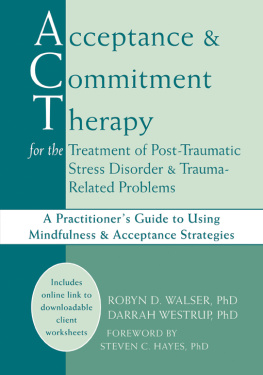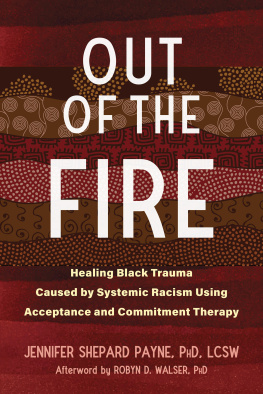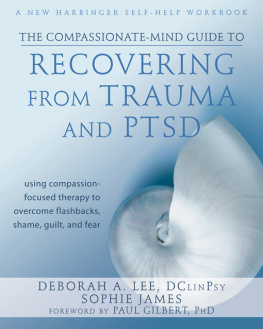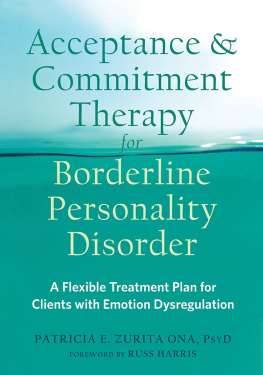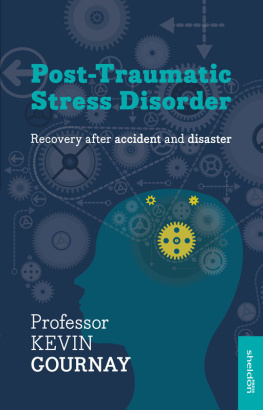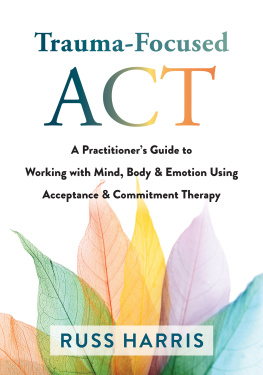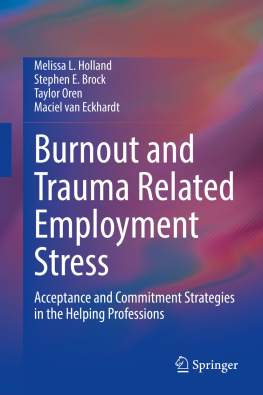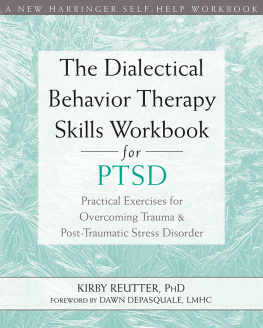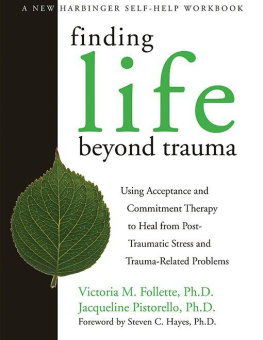Robyn D. Walser, Ph.D., works as a consultant, workshop presenter and therapist in her private business, TLConsultation Services () and she is a psychologist at the National Center for PTSD, Veterans Affairs Palo Alto Health Care System. Dr. Walser has expertise in traumatic stress, substance abuse, and acceptance and commitment therapy (ACT). She has been doing ACT workshop trainings both nationally and internationally since 1998; training in multiple formats and for multiple client problems. Dr. Walser continues to investigate the use of mindfulness and ACT in trauma populations.
Darrah Westrup, Ph.D., is an experienced ACT clinician with a private practice in Menlo Park, CA. She has conducted numerous ACT trainings and workshops, and provides ACT supervision on an ongoing basis. Dr. Westrup has extensive training and experience in PTSD, and along with her practice, is Program Attending of the Womens Trauma Recovery Program at the National Center for PTSD, and Program Director of the Womens Mental Health Center at the VA Palo Alto Health Care System.
The original hardcover edition of this book came with a bound-in CD-ROM that contained copies of the worksheets youll find in Acceptance and Commitment Therapy for the Treatment of Post-Traumatic Stress Disorder and Trauma-Related Problems. All these files are available to you as a free download at: 26469.nhpubs.com
This outstanding book offers clinicians a clear understanding of the traps of language and the paradoxical implications of trying to control our internal experiences. The authors bring years of experience working with survivors of trauma and a comprehensive grasp of their topic to this lucid explanation of acceptance and commitment therapy. Each of the treatment components is presented clearly and succinctly, yet integrated into a comprehensive whole. Illustrative case examples and session transcripts offer a vivid picture of the ACT approach.
Chad LeJeune, Ph.D., author of The Worry Trap: How to Free Yourself from Worry and Anxiety Using Acceptance and Commitment Therapy
Publishers Note
This publication is designed to provide accurate and authoritative information in regard to the subject matter covered. It is sold with the understanding that the publisher is not engaged in rendering psychological, financial, legal, or other professional services. If expert assistance or counseling is needed, the services of a competent professional should be sought.
Distributed in Canada by Raincoast Books
Copyright 2007 by Robyn D. Walser and Darrah Westrup
New Harbinger Publications, Inc.
5674 Shattuck Avenue
Oakland, CA 94609
www.newharbinger.com
All Rights Reserved
Acquired by Catharine Sutker; Cover design by Amy Shoup; Illustrations by Susan Pickett;
Edited by Carole Honeychurch; Text design by Tracy Carlson
ePub ISBN: 978-1-60882-646-9
The Library of Congress has cataloged the hard cover edition as:
Walser, Robyn D.
Acceptance and commitment therapy for the treatment of post-traumatic stress disorder and trauma-related problems : a practitioners guide to using mindfulness and acceptance strategies / Robyn D. Walser and Darrah Westrup.
p. ; cm.
ISBN-13: 978-1-57224-472-6 (hardcover)
ISBN-10: 1-57224-472-0 (hardcover)
1. Post-traumatic stress disorder--Treatment. 2. Acceptance and commitment therapy. 3. Trauma--Treatment. I. Westrup, Darrah. II. Title.
[DNLM: 1. Stress Disorders, Post-Traumatic--therapy. 2. Cognitive Therapy--methods. 3. Stress Disorders, Traumatic, Acute--therapy. WM 170 W222a 2007]
RC552.P67W374 2007
616.852106--dc22
2006102707
Acknowledgments
We would like to thank all those who have provided support in putting this book together, including friends and family. Most importantly, we each would like to thank our husbands, Mark Castoreno and Andrew Aitken. They have supported and tolerated many hours devoted to writing at the temporary expense of hours devoted to being together. We would like to acknowledge and thank Steven Hayes, whose incredible mind and talent have provided us with this compassionate approach to addressing human suffering. Finally, we would also like to thank our clients, who have struggled through this therapy, changed their lives, and provided hope for others who seek treatment for PTSD.
We would like to offer a special thanks to Susan Pickett (Robyns wonderful mom) for illustrating this book and for taking the time to put her artistic talents to work. Thanks, Mom!
Foreword
ACT and the Disorderly Process of Trauma
There is a special relationship between Acceptance and Commitment Therapy (ACT) and the field of trauma. There are a number of reasons for it, but I think one of these is deep and philosophical. It has to do with the nature of trauma and a parallel message inside ACT itself.
Behavior therapy has always had a kind of can do attitude, linked to an orderly agenda. It was built on the idea that carefully defined and empirically tested interventions, linked to basic behavioral principles, would allow human beings to get their activities more fully in order. When cognitive concepts were brought into the center of behavior therapy in the 1970s, that attitude did not change. Gone was the link to basic behavioral principles, but there was confidence that carefully defined and empirically tested interventions would allow human beings to get their minds more fully in order.
Inside the can do attitude of both of these first two generations of behavioral and cognitive therapy was a hidden problem, however. The cognitive and behavioral tradition implicitly adopted cultural beliefs about the importance of getting actions and attitudes in order. A great deal of effort was put into creating emotional and cognitive lives that were, well, tidy. We would get rid of bad feelings and create good ones. We would get rid of bad thoughts and replace them with healthy ones. Neat.
We are revisiting that issue now in the third generation of behavioral and cognitive therapy. Concepts like acceptance and mindfulness are not focused on the content of thoughts and feelings, but on our relationship to them. This is not a superficial change. It means we are fundamentally changing our view of whether order as we formerly understood it is important.
That very change is a somewhat confusing process. Challenging assumptions always is. Acceptance and mindfulness thus not only question the importance of orderliness in terms of formthey create disequilibrium in the field itself. Challenging order creates disorder. That very effect can be exciting, but it is not easy. In this era of development, everything is back on the table. And at a deep level, what is on the table is the whole issue of purpose. Instead of lives that are orderly, maybe it is better to seek lives that are open, flexible, and connected. Instead of feelings that are positive and controlled, maybe it is better to seek feelings that are deep, known, and accepted. Instead of thoughts that are proper, balanced, and rational, perhaps it is better to seek a relationship with our thoughts that is mindful, defused, and undefended.
The deep philosophical relation of all of this to trauma is based on an interesting parallel process. So far as I can recall, Ive never heard anyone question why we use the word disorder to speak of psychological difficulties. I suspect it is because of this secret embrace of a culturally established idea that a good life is an orderly process, and that other processes are, well, part of a disorder.
It does not seem to be true. Human lives generally are not tidy. We are filled moment to moment with feelings, memories, sensations, urges, and thoughtsand they are often messy, painful, and conflicting. Life itself can produce unpredictable challenges.

